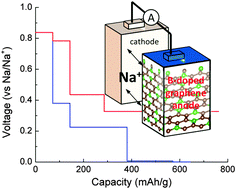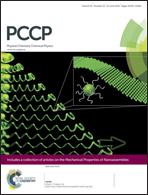Boron-doped graphene as a promising anode for Na-ion batteries†
Abstract
The Na-ion battery has recently gained a lot of interest as a low-cost alternative to the current Li-ion battery technology. Its feasibility strongly depends on the development of suitable electrode materials. In the present work we propose a novel anode candidate, boron-doped graphene, for the Na-ion battery. Our first-principles calculations demonstrate that the sodiation of boron-doped graphene well preserves its structural integrity. The 2D-BC3 anode has the average sodiation voltage of 0.44 V in an appropriate range to avoid the safety concerns caused by the formation of dendritic deposits. The capacity of the 2D-BC3 anode reaches ∼2.04 times that of the graphite anode in a Li-ion battery and ∼2.52 times that of hard carbon in a Na-ion battery. The high electronic mobility and Na mobility on boron-doped graphene indicates that it has a high potential to reach good rate performance. These suggest the promising potential of boron-doped graphene to serve as an anode for a rechargeable Na-ion battery.


 Please wait while we load your content...
Please wait while we load your content...